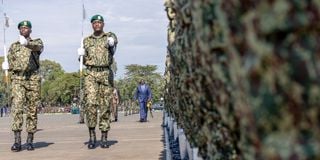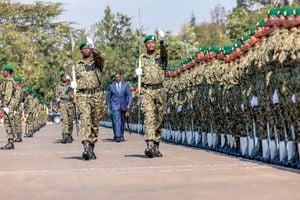
President William Ruto’s current push to incorporate arms training into the NYS echoes Kariuki's old vision.
President William Ruto’s dream of an arms-trained National Youth Service (NYS) is not new. It was one of the early dreams of fiery politician Josiah Mwangi Kariuki before some people thought it mischievous.
In the nascent days of Kenya’s independence, JM, as he was better known, envisioned an NYS that went beyond spades and shovels.

The late politician Josiah Mwangi (JM) Kariuki.
For Kariuki, who was assassinated in 1975, the NYS was not just about nation-building through community service; it was also about equipping the youth with military training “to defend the country in times of war or public emergencies”.
He said as much. Later, JM’s critics would start reading too much in his agenda.
Whatever he aimed at, if there was any mischief, it was never stated.
Mark Mwithaga, another fiery politician, always maintained that JM’s problems started after his appointment as NYS leader.
JM was flamboyant and attracted admirers and haters in equal measure.
He loved to don the NYS outfit and took joy in inspecting their guard of honour.
I have come across archival letters that JM wrote asking for a parade to be organised for him after a trip abroad. That was pure hubris.
Before I tell you why I am suspicious of President Ruto, let us first look at what JM was up to.
His idea was that NYS could be the training ground for recruits to the military and police.
During the debate of the National Youth Service Bill, JM begged the Parliament to pass a clause that would allow the NYS cadets to get into the military in the same ranks.
Thus, the NYS was to be a reservoir of disciplined, semi-trained recruits who could be absorbed into the military or police at a moment’s notice.
In the original clauses 10 and 17 of the National Youth Service Bill, JM clarified that military training should be a core component of the NYS.
He argued that young people should be ready to defend the country “in the event of war or similar major public emergencies”.

Politician Josiah Mwangi Kariuki, who was popularly known as JM Kariuki.
This reflected the geopolitical climate of the time, particularly with the looming threat of the Shifta War in Kenya’s northeastern region.
Said JM: “These people can always be called by the Head of State to serve in case of war, in various places in the army. It is important that they have some basic training in the camps to have the required discipline before they are taken over by the police or the army.”
If you look at the original NYS Act, there was the Youth Leader position reserved for a MP.
That leader happened to be JM. His appointment by President Jomo Kenyatta caused some fear because of Mossad’s connection with NYS.
The knowledge that NYS was modelled after Israel’s youth service and its first officers – including Waruhiu Itote – better known as General China – were trained in Tel Aviv, made some politicians shiver at the extent of JM’s networks.
Though President Ruto did not tell us why he wants to revive JM’s half-century-old dream, there are also dangers to having civilians trained in arms and then let loose as they wait for recruitment into either police or the Kenya Defence Forces.
Suppose they don’t join the police or the military?
Section 25 of the NYS Act permits its members to resign before their period of enlistment on personal or compassionate grounds.
We have heard of cattle rustlers who have had police or military training but opted to retire to become merchants of vice in their villages and towns.
Unless we are careful, Kenya can have a large pool of civilians trained to handle firearms but not absorbed into the police or the defence forces.
We also have to understand that the 1964 military was not as sophisticated as the force is today.
By then, those who supported JM argued that NYS and the military had drawn their recruits from those who could not advance academically.
As Kimamu Gichoya – then Kirinyaga East MP – said: “If somebody is going to be trained as an army man, he does not need a very advanced sort of education.”
The backdrop to Kariuki’s advocacy was the Shifta War, a secessionist conflict in which ethnic Somalis in Kenya’s Northern Frontier District sought to join the newly formed Republic of Somalia.
Kenya was also grappling with thousands of unemployed youths who had missed proper training during the emergency years or had their lives disrupted by the Mau Mau war.
The backdrop of President Ruto’s thinking could be the pressure he faced with Gen Z recently and the need to mobilise more armed personnel for future challenges.
Of course, one of the NYS functions is to conduct “paramilitary” training of the recruits, but the NYS Act is silent on whether they can be trained to handle firearms.
That is why the President’s suggestion is of interest.
This is my fear of an NYS trained in handling firearms – and I pray I am wrong.
Section 7(6) of the NYS Act allows the Inspector-General of Police “if it appears expedient” to request the National Police Commission to appoint NYS members as “special police officers…in the interests of public order and safety.”
Reading clause 7(7) tells you that the Inspector-General Police is given powers to recruit his own set of “special police officers”...”if it appears expedient”.
This recruitment is done with the approval of the National Security Council.
And that is where we should start to fear.
What guarantee do we have that NYS will not be a training ground for “special police officers” who operate under the approval of the National Security Council?
What guarantee do we have that we might not end up with a “special force” similar to the Gestapo in Nazi Germany?
This is a conversation that Kenyans should have and which requires serious public participation before it is implemented.
When JM was pushing for training of NYS personnel in handling firearms, we know that Kenya, in the 1960s and 70s, was under severe external threats from Somalia and Uganda’s Idi Amin, who wanted a chunk of our territory.
That could explain why the likes of Henry Wariithi could question the utility of spades and shovels in the face of such threats.
“We realise the shovels are important, but if they are being called to join the army in case of trouble, they should know how to use machine guns,” Wariithi argued.
But don’t we know that Wariithi was part of the group that was recruiting trainees destined for Israel?
JM’s vision was enshrined in Section 17 of the NYS Act, which authorised the President to deploy the NYS in times of war, insurrection, hostilities or public emergencies.
That clause still exists as Section 7(2) of the NYS Act and stipulates that the NYS could be called upon to “assist” the KDF and National Police Service in case of war or insurrection.
We currently have no definition of insurrection, nor do we have a time frame when the special police could operate.
During the Gen Z uprising, Kenyans were surprised by the high number of armed civilian “police” officers.
We have also seen an upsurge in kidnappings similar to what used to happen during the reign of Idi Amin’s State Research Bureau in Uganda.
That is why we should watch and demand transparency in NYS’ training to handle weapons and their possible recruitment into a Special Police Force.
Things can go wrong.
[email protected]; On X: @Johnkamau1







